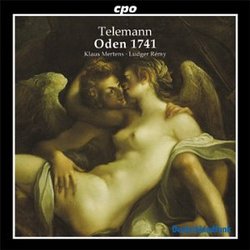| All Artists: Telemann, Mertens, Remy Title: Telemann: 24 Odes (1741) / Mertens Members Wishing: 0 Total Copies: 0 Label: Cpo Records Original Release Date: 1/1/2003 Re-Release Date: 8/19/2003 Genres: Pop, Classical Styles: Vocal Pop, Chamber Music, Historical Periods, Baroque (c.1600-1750), Classical (c.1770-1830) Number of Discs: 1 SwapaCD Credits: 1 UPC: 761203981625 |
Search - Telemann, Mertens, Remy :: Telemann: 24 Odes (1741) / Mertens
CD Details |
CD ReviewsTelemann Lieder : Proto-Schubertian Songs! J Scott Morrison | Middlebury VT, USA | 09/25/2003 (5 out of 5 stars) "I've been on a Telemann kick lately and admit that until recently I had consigned him to the second rank of composers. He had the misfortune to be in the same generation as Bach, Handel and Domenico Scarlatti. The fact that he was so very prolific also has caused some to downgrade his output as facile and shallow. But, as I've come to learn, his music is often deeply moving and he was surely one of the best tunesmiths in German music prior to Mozart and Schubert. What I did not realize about Telemann, and what this CD helps to establish, is that he was a marvelous song-writer; I had thought of him primarily in terms of instrumental and sacred music. Indeed, we tend to think that German lieder really didn't get started much before Beethoven. Mozart's songs (as distinct from his opera and concert arias) are not his strongest suit. Nor are those of Beethoven. It's only when we get to Schubert that lieder assume their core importance in German art music. But here we have Telemann whose 'Oden' ('Odes,' a German word synonymous in its time with the word 'Lieder' ['Songs']) are not only competent but indeed beautiful and necessary to our understanding of the lied's later development. Art songs, of course, arose from folksongs. Refinement of text, melody and accompaniment figure in this rise. In Telemann's '24 Songs of 1741' we can sense this rise occurring. The texts are provided by such poets as Friedrich von Hagedorn, Daniel Stoppe, Johann Matthias Dreyer and Johann Arnold Ebert. They are primarily anacreontic, i.e. lyrics that celebrate youth, pleasure, friendship. Thus, a paean to wine: "Prince and king of drinks,/you best gift on earth,/provider of much peace," youthful pursuits: "... It's a firm rule,/what remains of my youth/shall grant me pleasure," and friendship: "... who even in sad times/dares to remain my friend?"The songs are all strophic. The harpsichord accompaniments are generally minimally contrapuntal; the voice is clearly the important partner here, the accompaniment remaining discreetly in the background. If one listens closely, though, one discovers all sorts of felicities in turns of phrase and harmony in the accompaniments. One of the times I listened to this CD I listened primarily to the harpsichord's contribution and was repeatedly pleased and surprised. The playing of Ludger Rémy, the accompanist and a specialist in German baroque repertoire, is masterful. My only complaint is that the sound of the harpsichord is perhaps a bit too recessed. On the other hand, the contribution of the singer, baritone Klaus Mertens, cannot be too highly praised. His voice, dare I say it?-a kind of youngish Fischer-Dieskau with more innately beautiful voice, is perfect for these unpretentious songs. He projects the meanings of the texts through skillful acting with the voice. His diction is impeccable. I rarely had to consult the German text for clarification, and when I did it was more often because of my imperfect German, not because of his diction.About my comparing him to Schubert: Memorable tunes come one after the other in this collection. My favorite was 'Das Lachen' ('Laughter') with its Scotch-snap chuckles. I can hear a direct connection between his way of constructing a melody and that of the young Schubert, particularly in the latter's less-sophisticated strophic songs. Granted there is precedent for this--think of Bach in his secular cantatas, say--but I was struck again and again by the kinship between Telemann's melodies and those of his sainted successor, the king of lieder, Schubert. If you love Schubert, I think you'll love these songs.The recorded sound is quite good. The aural ambience is slightly resonant and, as mentioned, the harpsichord is slightly recessed. Often in song recordings there is some ear-fatigue by the time one gets to the end of a disc largely because of the acoustic. That simply does not happen in this natural-sounding CD. Recommended.TT=69:08Scott Morrison"
|

